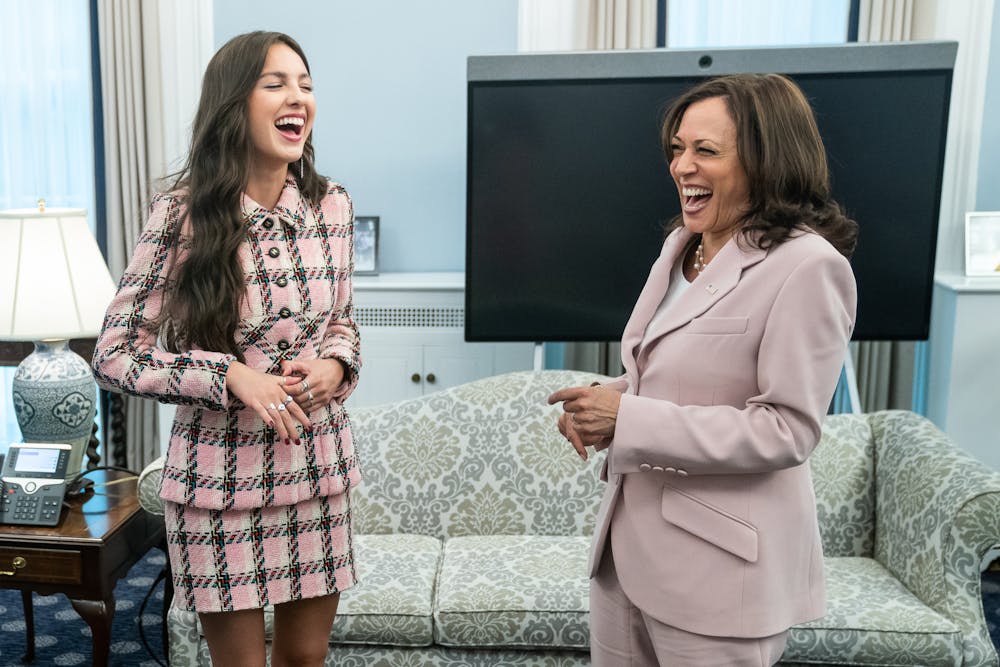Nowadays, it seems like presidential campaigns cannot exist without celebrity influence.
Celebrities like Megan Thee Stallion, Beyoncé, Julia Roberts and Bruce Springsteen have all endorsed Vice President Kamala Harris, and they have appeared at events to rally support among voters.
But do these endorsements actually have an impact on elections and voter involvement? Studies point to yes. Data from a recent study by Ashley Spillane at the Harvard Kennedy School suggests that there is a strong correlation between celebrity influence and voter engagement.
In the late 18th and early 19th centuries, as states gradually revised their voting legislation to prohibit voting on the basis of race and gender rather than on the basis of property ownership, there arose a need to disseminate campaign information to a new kind of voting base — one less familiar with the political process and on average, less literate.
“Voters respond better to authentic messaging from influencers that conveys personal passion and doesn’t require a high production value,” Spillane wrote in the study. “Celebrities, defined broadly as famous people, are distinctively positioned to tackle this critical issue because of their ability to garner media coverage, attract large crowds, reach their fans, and influence society.”
Campaign anthems were a precise vehicle for political messaging, and they were designed to be easily replicable before commercial music reproduction. Today, however, candidates’ songs are no longer written or even lyricized for them individually. Frank Sinatra’s “High Hopes” (written for 1960 presidential candidate John F. Kennedy, commonly referred to then as ‘the nation’s favorite guy’) is now supplanted by Beyoncé’s “Freedom,” chosen as Harris’s official campaign song and as the accompaniment to her “We Choose Freedom” advertisement. But if you were to ask one demographic of voters in particular (hint: they sit next to you in all your classes) what they associate most with the Vice President, it is more likely to be her coconut tree-analogy than any of Beyoncé’s music.
And, for us, more memorable than any of the cameos at the Democratic National Convention cameos is Chappell Roan’s refusal to perform at the White House for Pride Month this past summer.
“We want liberty, freedom and justice for all. When you do that, that’s when I’ll come,” Roan said during her set at the Governor’s Ball in New York.
This September, a single Instagram story from Taylor Swift calling for voter registration had a demonstrable impact on the political behavior of her followers: The post drew 337,826 visitors to the vote.gov site within the 24 hours it was up online.
Authenticity is important to voters, so when their favorite celebrity makes a political statement, campaigning and engagement can feel much more relevant and important. For example, some Swifties have decided to get more involved in local campaigning after seeing posts from the star online.
This past weekend, Puerto Rican artist and global superstar Benito Antonio Martínez Ocasio, who records music under the moniker Bad Bunny, endorsed Harris in an Instagram story after racist comments about his home country were made by speakers at a Trump rally in New York City. This act could boost Latino support within Harris’ base, which has weakened since the beginning of her campaign and is an important demographic she must secure to succeed in November.
Think about it: If your favorite artist endorsed a certain candidate online, would you feel more inclined to engage with the campaign? Maybe yes, maybe no. Nevertheless, celebrities play an important role in impacting voter behavior.
It is not just Democrats who rely on celebrity endorsement — several right-wing celebrities have vocalized their support for Trump. Billionaire Elon Musk’s Super PAC has been rewarding supporters who sign his petition in support of first and second amendment freedoms, with the chance to win one million dollars. The sweepstakes, which have been labeled as an illegal lottery, caused the Philadelphia District Attorney to sue Musk for possibly violating federal laws around bribery. Other celebrities like actor Mel Gibson, online sensation Joe Exotic and boxer Mike Tyson, among others, have all pledged their support for the GOP candidate.
Podcasts work similarly to celebrity endorsement, they allow candidates to tap into a certain and very specific demographic while in a controlled environment. Harris recently went on the “Call Her Daddy” podcast with host Alexandra Cooper to speak about women’s health issues like abortion rights. The show often discusses topics like sex and relationships. The show gave Harris a unique opportunity to speak to a variety of voters — about half of the audience says they're Democrats, a quarter says they're Republican and about 20% say they are independent. She also appeared on “All the Smoke,” hosted by former NBA stars Matt Barnes and Stephen Jackson.
“Call Her Daddy” ranks seventh among all U.S. podcasts, third among all women and second among women between the ages of 18-29. “All the Smoke” holds 86th place in U.S. podcasts, and 18th among African-Americans, with an audience overwhelmingly male (89%) mostly ages 25-44.
Trump has appeared on the “Joe Rogan Experience” podcast for a three-hour episode that aimed to bolster support from male listeners. He also appeared on “This Past Weekend w/ Theo Von” which ranks fifth among men 18-34 and the “Lex Fridman Podcast” which ranks 36th among white men.
Whether or not you are influenced by celebrity anthems and endorsements, their impact is undeniably significant on politics as a whole.
Norah Khan '27 (she/her) is an News Editor.
Norah has previously served as a Arts & Culture Editor. She is majoring in Political Science and English, with minor in Spanish. Outside of The Campus, she is involved with Matriculate as an Advising Fellow and the Conflict Transformation Collaborative as a Conflict Coaching Peer Facilitator.




